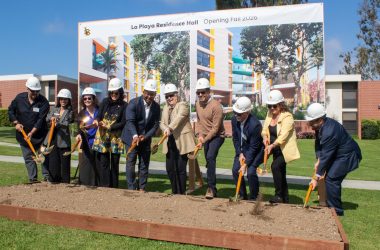The Associated Students, Inc. Board of Control decided Tuesday to form an ad hoc committee to further discuss the executive pay proposal that has caused controversy amongst ASI executives.
An ad hoc is a committee formed for a specific task. The ad hoc would be overseen by ASI Treasurer Wendy Lewis, with the objective of determining what changes to the executive pay policy would be most beneficial to students.
“I think that that was a good decision because essentially we are the executives, but we do represent so many students and everybody should have an opportunity, if they’d like, to have input on this,” Lewis said. “It takes a long time to go through these policies … it would basically be an opportunity to have all the experts come around a table and to be able to have the correct input so that when we do put a policy out, it’s been looked at and it’s been created by [people] who know this stuff.”
The policy was originally on the meeting agenda as an action item to be voted on by the BOC, but ASI President Jose Salazar motioned to make it a discussion item and the board approved. Lewis later said that the executives, Salazar included, realized earlier that the policy was not yet ready to be voted on and they previously agreed it would be best to move it back into discussion.
Salazar originally proposed revising the executive pay policy in June after he discovered he could not be legally compensated for his job due to being undocumented and having not completed the Deferred Action for Childhood Arrivals paperwork.
The BOC has deliberated the proposal since June, which would change the way executives are paid. Although the policy changes would not be enacted until July 2016, which is after Salazar’s term ends, he has been pushing for the change.
“The whole reason I’m pushing this is because … I would never want this to happen to someone else,” Salazar said in an interview last week. “I would never want them to be in the same situation that I was put in. I already have a lot of difficulties being undocumented, it’s very hard for me to find a job that pays well.”
The current policy states that executives are compensated through a fellowship, in bi-monthly payments of $632. Salazar’s proposal would change that into a scholarship to be paid in larger sums, once in the fall and once in the spring semesters.
Under AB 844, undocumented students are allowed to be paid only through grants, scholarships, fee waivers or reimbursements for expenses.
During the BOC meeting, ASI executives and officials discussed the implications of the policy changes. Associate Vice President of Financial Management at CSULB, Sharon Taylor, noted a “clear divide between a scholarship and compensation.”
Some of the implications discussed are that if the payment is changed to a scholarship, then nothing in the executive policy can mandate that the executive positions be treated like jobs. They cannot require office hours or prevent executives from holding another job.
“I think it’s the accountability piece that keeps bringing its head to the top,” Taylor said. “When you make this change, you have to be realistic: you are losing accountability. They don’t have to show up at their office at all. You can have an expectation in your bylaws … but if someone never shows up, there’s nothing you can do.”
Salazar said that executives are exposed to media pressures and pressures from their constituency and that would provide enough accountability to ensure the executives would do their job.
Senator Carlos Vegara pointed out that students in the President’s Scholar Program cannot stop meeting the volunteer hour criteria in the middle of the program and suggested the board look into their accountability measures. Taylor said that the process to disqualify a President’s Scholar who is not performing is much shorter than the process to impeach an executive in ASI.
Lewis said she will have Salazar and Miriam Hernandez, vice president of ASI, give their input with the ad hoc committee and she would like to have student input on the committee as well.
Hernandez told the board that in the meantime she and Lewis are working with the Dream Success Center to create an information packet that would help any undocumented students who may want to run for office prepare for their DACA and other necessary paperwork for the 2016 elections.



